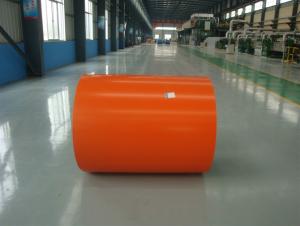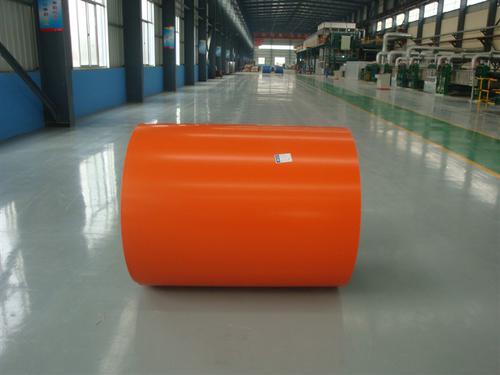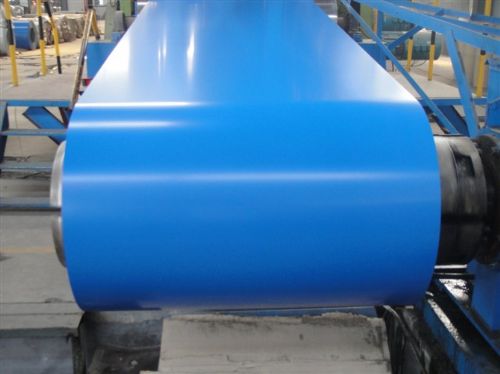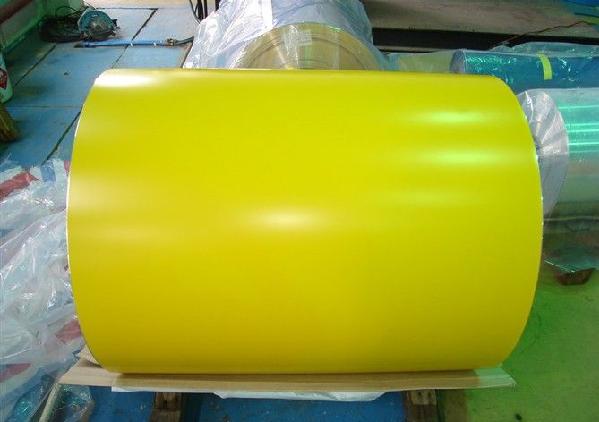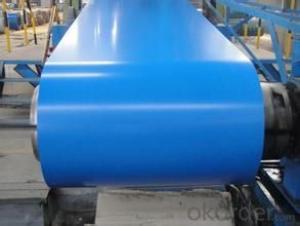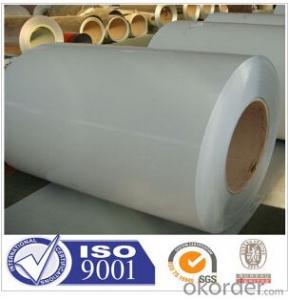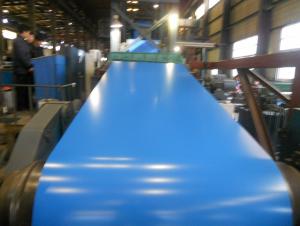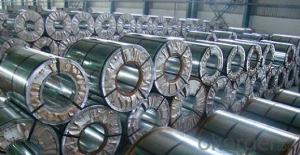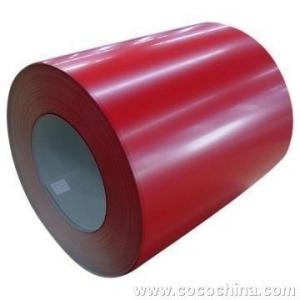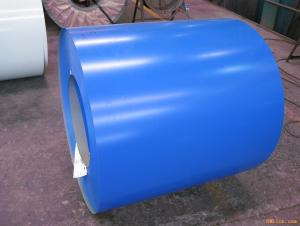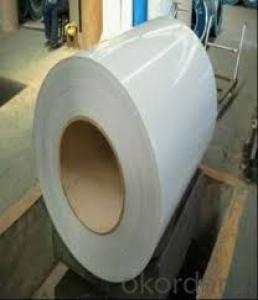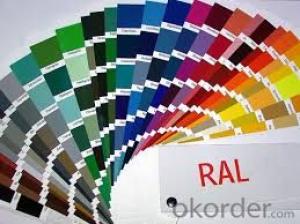PRE-PAINTED GALVANIZED STEEL COIL
- Loading Port:
- Tianjin
- Payment Terms:
- TT OR LC
- Min Order Qty:
- -
- Supply Capability:
- 8000 m.t./month
OKorder Service Pledge
Quality Product, Order Online Tracking, Timely Delivery
OKorder Financial Service
Credit Rating, Credit Services, Credit Purchasing
You Might Also Like
THICKNESS:0.18mm-1.5mm
WIDTH:900mm-1250mm
COATING MASS:Z30-Z275
PAINT:PE、HP、HDP、PVDF、SMP、MATT、PVDF
COLOR:RAL Scale
COIL INNER DIAMETER:508mm/610mm
COIL WEIGHT:3mt-7mt
BASE MATERIAL:Hot-dip GALVANIZED Steel
- Q: I am in the market for a good hunting knife under $100. I am primarily looking for a knife that will keep it's edge. What type of steel should I be looking for?
- Don't know much about steels, but apparently SV30 is the toughest son of ore you can look for, and it's so tough I've heard of knife makers rejecting it for softer steel. Look for Gerber and Buck for low end SV30 knives under $100.
- Q: What are the different types of steel coil coatings for corrosion resistance?
- There are several different types of steel coil coatings that are specifically designed to provide corrosion resistance. These coatings can be categorized into two main types: organic coatings and metallic coatings. 1. Organic Coatings: - Polyester: Polyester coatings are commonly used for steel coil applications due to their excellent corrosion resistance and durability. They offer good weatherability and resistance to chemicals, making them suitable for outdoor applications. - Polyvinylidene Fluoride (PVDF): PVDF coatings are highly resistant to UV radiation, weathering, and chemicals. They provide exceptional durability and are often used in demanding environments such as coastal areas or industrial settings. - Polyurethane: Polyurethane coatings offer excellent abrasion resistance and provide a high level of corrosion protection. They are commonly used in applications where there is a higher risk of mechanical damage or exposure to harsh conditions. - Epoxy: Epoxy coatings provide excellent adhesion and chemical resistance. They are often used in industrial applications where resistance to chemicals, solvents, and oils is required. 2. Metallic Coatings: - Galvanized Coatings: Galvanized coatings involve applying a layer of zinc to the steel surface through a hot-dip or electroplating process. This creates a barrier between the steel and the surrounding environment, providing effective corrosion protection. Galvanized coatings are widely used in various industries due to their cost-effectiveness and good durability. - Galvannealed Coatings: Galvannealed coatings are similar to galvanized coatings but undergo an additional heat treatment process. This results in a coating with increased hardness and improved paint adhesion, making it suitable for applications that require additional surface protection or paintability. It is important to consider the specific requirements of the application and the level of corrosion resistance needed when selecting the appropriate steel coil coating. Consulting with coating manufacturers or industry experts can help determine the most suitable coating for a particular application.
- Q: What are the advantages of using steel coils in construction?
- There are several advantages of using steel coils in construction. Firstly, steel coils are extremely strong and durable. They have a high tensile strength, which means they can withstand heavy loads and resist deformation. This makes them ideal for structural applications in construction, such as beams, columns, and frames. Secondly, steel coils are highly versatile. They can be easily shaped and molded into various forms, allowing for flexibility in design and construction. Steel coils can be rolled, bent, cut, and welded to meet specific project requirements. This adaptability makes them suitable for a wide range of construction applications. Another advantage of using steel coils in construction is their resistance to corrosion. Steel coils are often coated with protective coatings, such as galvanized or stainless steel, to prevent rusting and corrosion. This ensures that the structural integrity of the building remains intact over time, even in harsh environmental conditions. Furthermore, steel coils offer excellent fire resistance. Unlike other construction materials like wood, steel does not burn or contribute to the spread of fire. This makes it a safer choice for construction, particularly in high-rise buildings or areas prone to fire hazards. Lastly, steel coils are cost-effective. While the initial cost of using steel coils may be higher compared to some other materials, their longevity and low maintenance requirements make them a cost-efficient option in the long run. Steel coils have a long lifespan and require minimal repairs or replacements, resulting in reduced maintenance costs and increased overall value. In conclusion, the advantages of using steel coils in construction include their strength, versatility, corrosion resistance, fire resistance, and cost-effectiveness. These qualities make steel coils an excellent choice for various construction applications, contributing to the durability and safety of buildings.
- Q: how much pressure can steel withstand? and how much pressure can concrete withstand? per m3 or cm3? thanks
- About all I remember is concrete can stand tremendous compression but almost no stretch .
- Q: I was curious to what type of steel I should get if I wanted something that kept its edge longer than 154cm but is still just as stainless. I don't know much about knife steels inform me please?
- 154cm is a very good knife steel, the problem is in the heat treating. Stainless should be cryo treated to get all it can offer. That being said, if you really want to drop some coin, look at getting one made from CPM 440V. Stainless isn't as strong as carbon but on a smaller knife works well. You might also look for D-2 Tool steel. There are factory knives that are made of that.
- Q: Is there any noticable or perceived difference between smoking out of a pipe with a brass screen and a stainless steel screen?
- I have been searching the internet, trying to find out the difference, myself... I know what I have heard from others; that the stainless steel is more rigid, and harder to mold to the bowl. I've heard that brass is softer, and previously thought it was healthier, but someone recently told me the opposite to what I'd heard. The one thing I do know for sure is that you're supposed to heat both sides of either with a lighter to oxidize anything that doesn't need to be there... If you do find the answer, I'd love to hear it... Cheers!
- Q: How are steel coils used in the production of shelving units?
- Steel coils are used in the production of shelving units by being processed and formed into various components such as shelves, brackets, and support beams. These coils are typically cut, bent, and welded to create the necessary shapes and sizes required for the shelving unit. The steel material provides strength and durability to the shelves, ensuring they can hold heavy items and withstand the weight placed on them.
- Q: Can steel coils be used in electrical applications?
- Certainly, electrical applications can make use of steel coils. In the realm of electrical circuits, steel coils often serve as magnetic cores in transformers and inductors, which are indispensable components. The steel employed in these coils typically consists of high-quality electrical steel, possessing distinct magnetic attributes, including low core losses and high permeability. These attributes empower the steel coils to efficiently transmit electrical energy between various circuit components. Furthermore, steel coils can also find utility in other electrical applications, such as the construction of electric motors and generators. Taking everything into account, steel coils are extensively employed in electrical applications due to their magnetic properties and their capacity to handle high currents and temperatures.
- Q: How are steel coils used in the production of shipping containers?
- Steel coils are used in the production of shipping containers as they provide the necessary strength and durability required to withstand the demands of transportation and storage. These coils are shaped and welded into the appropriate dimensions to form the walls, roof, and floor of the container. The high tensile strength of steel ensures that the container can withstand heavy loads, impacts, and harsh weather conditions, making it an ideal choice for shipping and protecting goods.
- Q: How are steel coils used in the manufacturing of doors and windows?
- Steel coils are used in the manufacturing of doors and windows as they provide the necessary strength and durability required for these products. The coils are first processed and shaped into the desired form, which is then used as the base material for constructing the frames and panels of doors and windows. The steel coils also undergo various treatments, such as galvanization or coating, to enhance their resistance to corrosion and weathering. Overall, steel coils play a crucial role in ensuring the structural integrity and longevity of doors and windows.
Send your message to us
PRE-PAINTED GALVANIZED STEEL COIL
- Loading Port:
- Tianjin
- Payment Terms:
- TT OR LC
- Min Order Qty:
- -
- Supply Capability:
- 8000 m.t./month
OKorder Service Pledge
Quality Product, Order Online Tracking, Timely Delivery
OKorder Financial Service
Credit Rating, Credit Services, Credit Purchasing
Similar products
Hot products
Hot Searches
Related keywords
